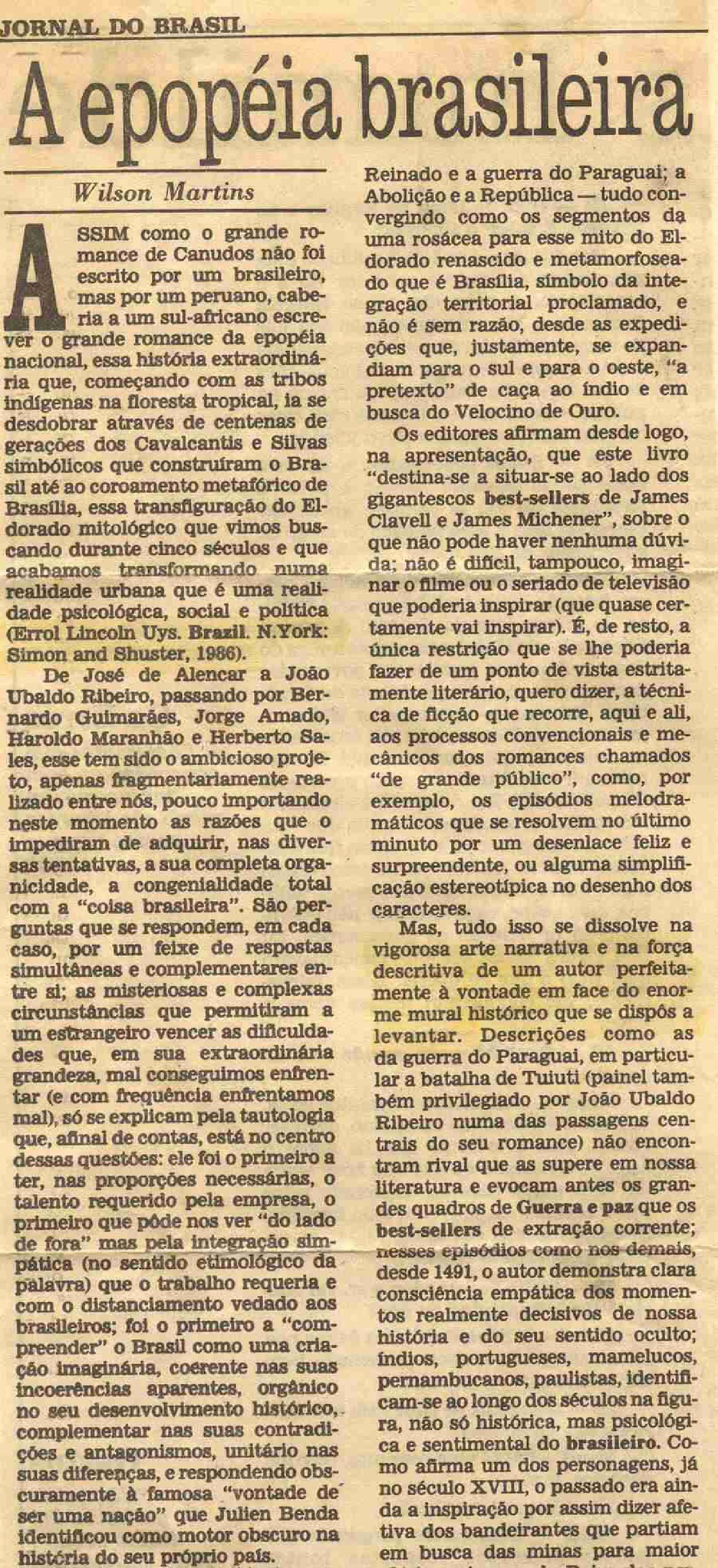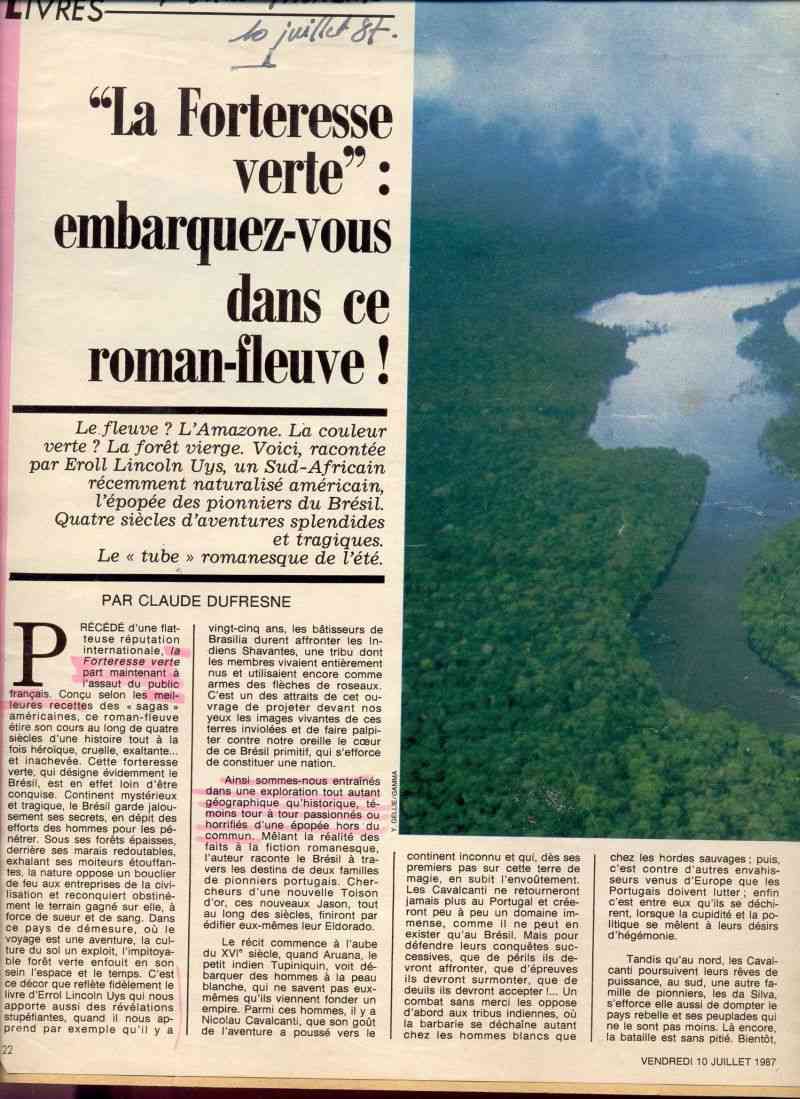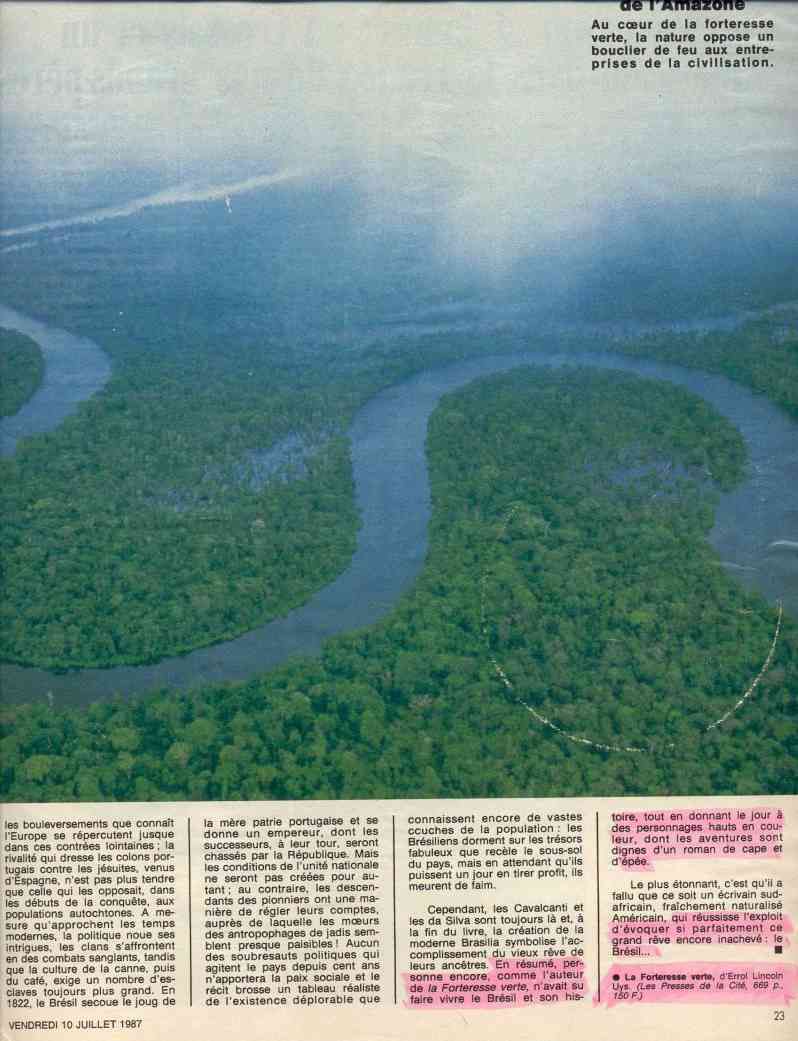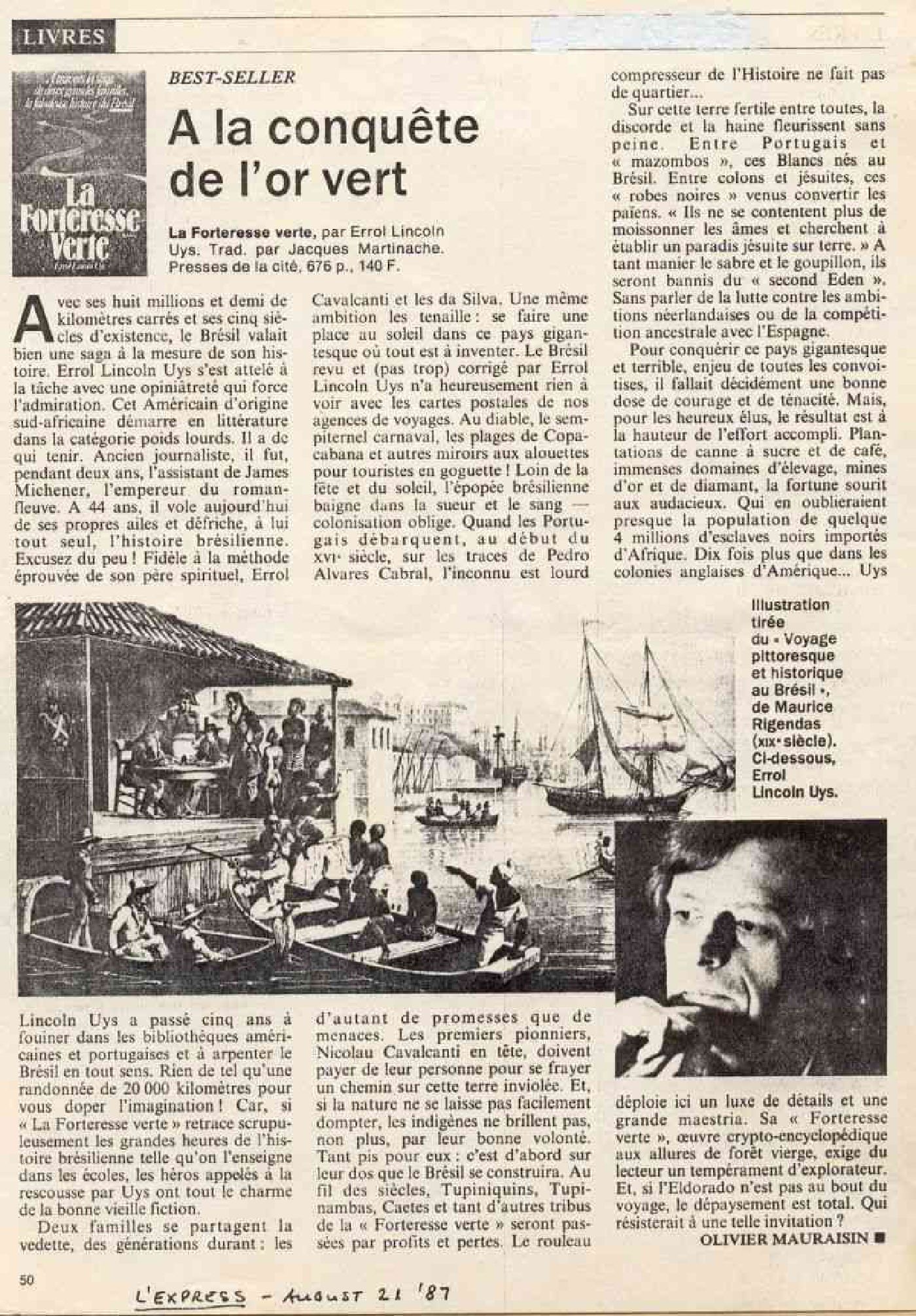
My father was on a trip along the Congo River, when he found a copy of Brazil on a boat. It had mud on its pages, half of which had been in the water. The book had been dried by someone who wanted to preserve it. Now my father picked it up; he liked the first chapters so much that he brought Brazil back to Portugal.
Years later I decided to read Brazil. Your book changed my life. Not only was I authentically able to live and to feel every place and every character in Brazil, but it gave me a completely new way of viewing Brazilian and Portuguese history. Suddenly everything seemed clear: The raw truthfulness that was the reality of those times and which never comes across so clearly or vividly in history books.
Truly, Brazil is a masterpiece!
While I was reading your book, a strange coincidence happened to me in Lisbon: One morning I woke up and started reading where I last left the story, your narrative beginning to describe an earthquake.
The bells of Lisbon’s churches started ringing outside. I read the entire section about the earthquake accompanied by the bells just beyond. The whole truth of that day struck me. I was reading your words about the events of November 1, 1755 on the morning of November 1, 2005 -- The bells rang as a memorial to the victims of the tragedy 250 years ago.
After I finished Brazil, I bought a mint condition copy for my library. But I couldn’t just keep this amazing masterpiece to myself. I had to share it! That first copy ended up in Italy with a good friend studying literature in Bologna. He immediately fell in love with the story.
A second copy went to a Brazilian colleague, who knew little English. I proposed a challenge: I suggested she arm herself with a dictionary and learn the language while reading Brazil. Amazingly, a year later I found her on Facebook. The first thing she told me was that she had read Brazil cover to cover!
I’ve given two more copies of your work to really important people in my life. – The copy I have bought today will go to my son’s hands. It is my wish that he read your words as avidly as I have on this fantastic journey through the centuries. I thank you for writing Brazil.
-- Vasco Cartó
I am a Cavalcanti born in Recife, Pernambuco. And much like you I immigrated to America in the early 1980s, where I now pursue an academic career
But here is where the story gets its funny twist...I married a da Silva! We both came here together. Imagine my surprise when I found a serious novel about my country centering on 500 years of our two families! It was too good to be true! It was love at first sight!
And now that our son has reached adolescence, his 14th birthday present was a copy of your novel. We want him to know more about his heritage and his two families, even if in novel form.
Here is what I wrote in his copy of your book.
Dear Gui,
In this book you will find 500 years of your family in novel form. You will learn much about all of us who have preceded you — how we struggled to live meaningful lives while helping to build a country we now call Brazil.Those of us who came before you had to answer the same questions you will face in your life. "Who am I?" "Where do I come from?" "How do I find happiness?" Much like you, we carried the blessings and curses of being all too human. Much like you, we made our mistakes(and had to live with them,) delighted in our victories, and found a sense of purpose in life over a life time...
On the eve of your adolescence, I chose to give you this book as a rite of passage. Not many people have a chance to benefit from 500 years of their ancestor's experience...So you should be proud and humbled of who you are, of your heritage. You are the result of many stories and many lives who have contributed to your own pilgrimage. These folks will be silent witnesses as you carve your own path.
I hope you learn from their lessons, from their failures and successes. As you look within you will find that the same sparkle of life that burned their souls is also part of you; it burns bright inside you...
And you, sir, made this gift possible. I cannot thank you enough.
— Hilquais (Keo) Cavalcanti
Brazil is the epic saga of a nation I knew little about until I got sucked into its history by this master story-teller. Not only is Brazil a "vast novel to tell the story of a vast country," as Publisher's Weekly notes, it covers a vast time span with a mighty cast of characters — many of whom leapt from the pages to imprint themselves so indelibly on my mind that I doubt I shall every forget them. Aruanã, the warrior prince of the Tupiniquin tribe; Amador da Silva,pioneer and bandeirante whom I both loved and hated; Secundus Proot the Dutch artist da Silva takes into the jungle so he can paint the natives in their natural environment; Padre Inácio Cavalcanti, the saintly Jesuit missionary, who spends his life laboring among and loving the native tribes.
A whole cavalcade of heroes and villains takes the reader on a roller coaster through history from 1490 before the Portuguese arrive right through to the beginning of the 21st century. There are slavers and soldiers, pioneers and fortune seekers, rebels and nation builders. Uys plunges us into the native cultures of both jungle and desert, embroils us in wars and slave rebellions, and threads the entire massive epic together with the stories, passions and endeavors of two families: the Cavalcantis and the da Silvas. Characters reappear as history forges onwards, leading us from one great event to another.
I am a reader who usually has four or five books of both fiction and non-fiction going simultaneously. Brazil is not one of those books. Brazil demands only book status. It is a truly amazing read. One that I cannot recommend highly enough.
— Beryl Singleton Bissel, author of The Scent of God, a Memoir
A great work of fiction and a profound and scholarly knowledge of five centuries of Brazilian history. Your research truly depicts the life and soul of a people about whom not much has been written in the English language.
Brazil is a classic which will be enjoyed by many in the years to come.
— Agenor Soares dos Santos
My name is Moises dos Santos and I recently read your novel. It was such an amazing work that I had to email you to congratulate and thank you. I only regret that I didn't get a chance to read Brazil sooner.
Your book was revolutionary for my life: I am Brazilian but have lived in the United States since the age of two. After reading your novel I feel I can regain the culture that I lost — I feel more "Brazilian!"
I don't believe I would ever have felt this strongly about my people if I hadn't read your book. I'm sure you must recognize that your masterful work has the power to evoke in us Brazilians the feeling of true heritage and culture.
— Moises A. dos Santo
I want to thank you for one of the most fascinating books I have read. I am married to a Brazilian and admit I probably wouldn't have cracked the cover if that were not the case. But I did and am grateful for that.
I have the 1986 edition. I am about one third of the way through but I have read from the beginning to that point three times now. I am mesmerized by the characters and their exploits in the early chapters, but I will push on now.
I find it easy to place myself in the jungle, hamlets, towns and estates, meeting the Indians, Dutch, Jesuits and others. Thanks again for a marvelous work.
— Tony Rubolotta
Brazil draws me on as surely as the mystery of South America itself. Antonio Paciência, a sweet innocent kid playing with friends one minute and the next drug into the incredible realization that he was a bit too dark to be OK. My adopted son from Peru often would hold up his arm to mine and comment..."see how black I am." His father's family is from Brazil, his mother is from the upper Amazon River. He is a dark reddish copper with blue/black hair and near black eyes...he would have been sold to the highest bidder. He embodies the mixed heritage that is South America. Your writing spells it out in simple and often horrifying glimpses...the ingredients of how this mad and lusty world was formed. Thank you for this work, your love and feel of the land and its people shows through. We will return to the river next summer for a month of living in the jungle...I'll realize even more just where I am having read Brazil.
— Steve Heath
Brazil shows the juxtaposition of sensual and brutal Brazil. It is amazingly on target not only in the historical sense but also insightful for the complex modern Brazil, principally the all important extended family: A theme vividly illustrated in the first chapters and carried throughout the novel.
We noted the long years of historical research for your recreation of the Brazilian family and its pivotal role in Brazilian political, economic and social development.
In this way you follow Gilberto Freyre's view about the importance of the patriarchal family in Brazil, contrasted with the importance of Church and State in other Latin American countries.
Freyre supposed that you perhaps had got a jornal intime of some Brazilian family not yet published. Is he right?
I congratulate you on your monumental novel!
— Edson Nery da Fonseca
I am an avid reader of novels which try to humanize the history of a country by telling it through fictional family lines, whose lives are enmeshed is real, bona-fide historical events. But for a book truly to work, two pre-conditions must be in place: the characters in question should be drawn from dissimilar backgrounds, which depends mostly on the appeal of the country depicted (Michener's Hawaii springs to mind) plus the author must be highly conversant with its social history and have enough flair to sustain interest over the multitude of characters, episodes and, ultimately, pages.
Brazil and Errol Lincoln Uys fit the bill perfectly. The country is a fascinating amalgam of colonizers, native Indians and slaves and Uys has a compelling narrative style with down-to-earth dialogue, a first-rate selection of events to illustrate, leading to many a sub-climax, and a wealth of representative individuals to portray. You will be spellbound by the detail of the life and customs of the Tupi Indians, you will shake your head with disbelief at the Boy's Own adventures of the bandeirantes and you will be carried away by the treachery of the first failed movements for independence, mirroring those in the United States.
The section on the devastating Paraguayan War is my favorite in a continuous stream of highlights, with its cinematic sweep from bloody battlefields and wounded soldiers to corrupt dictators and their beautiful mistresses.
Just as a postscript: this book inspired me to learn Portuguese, travel to Brazil and study its history; I can not personally praise it more than that.
— John Malathronas, author of Brazil: Life, Blood and Soul
I enjoyed your outstanding novel Brazil as much as the great classics of Brazilian literature by Jorge Amado or Gilberto Freyre's Master's and Slaves and Mansions and Shanties.
I don't think that the late, great James A. Michener or Edward Rutherford, author of the well-written Sarum and Russka could have written about Brazil as well as you did.
— Craig H. Lockard
Your novel was the first book I ever read about Brazil. At the time I was a graduate student at Johns Hopkins University and was rethinking my desire to be an Africanist. John Russell Wood lent me his copy of Brazil and I was hooked. I subsequently went on to focus in Brazilian history for my academic career.
— Judy Bieber
I read your entire book aloud to my husband on a series of trips we made. — He drove; I read. — We started in Mato Grosso and finished somewhere in Kansas! The edition we read was an even 1,000 pages. Loved it! It's fabulous! Congratulations for writing it.
— Birdie Hope
Brazil is one of those volumes that I often loan to people who are headed to Brazil for the first time. I take it as an endorsement that the book was not returned to me the last time around, so I am very glad that a new edition is available.
— Professor Charles H. Wood, Center for Latin American Studies, University of Florida
Brazil was recently recommended on an online discussion group on AOL about various Brazilian topics. I gave it my strongest recommendations and have learned that others have enjoyed reading it. This message is to convey my thanks for writing such an enjoyable book that treats its subject with the candor, vibrancy and affection that it deserves. This is all the more true when one compares your book with that travesty about Brazil written by John Updike, who didn't do his work on the subject matter. A deeply felt thank-you for doing yours.
— Doug Auwater
I am a third of the way through Brazil and am nursing it along not wanting it to end. Thank you for giving such a great — and grand — overview of Brazil, its history and people. I am amazed as how MUCH Brazilian history is becoming clearer in the context of this historical fiction — Like Michener's Source helped me understand the Old Testament as nothing else I'd ever studied. Thanks for the hard work you put into Brazil. I wish more people who know and love Brazil knew what a great book it is.
— Nina Velasco
As a Brazilian, I want to compliment you for your success in writing a novel that so aptly represents my country, our traditions and our culture.
I was born in the city of São Paulo and my family is a traditional Paulista family. My father is descended on both sides from Portuguese people who arrived in Brazil in the 17th century. My mother comes from a very old Brazilian family, some from the interior of Sao Paulo state and some from Rio de Janeiro.
Brazil is a country of enormous contrasts and you had great insight in reflecting such differences in your book through the lives of two fictional families, one from the north and one from the south. When I read your book some of those feelings I had about the contrasting reality we face daily in Brazil were translated into words. I felt that a puzzle was finally put into place. I hope that writing this book has given you as much pleasure as I had in reading it.
— Maria Pereira de Queiroz Brandão Teixeira
A beautiful work! It took more than a month to read your book, but I enjoyed every moment. It's one of the most solid researches I've seen covering five centuries of Brazil's multifaceted history. The story line is gripping, easy to understand. My sincere congratulations.
— Professor Max Justo Guedes
by Professor Wilson Martins, Jornal do Brasil
"Uys has accomplished what no Brazilian author from José de Alencar to Jorge Amado wasable to do. He is the first to write our national epic in all its decisive episodes, from the indigenous civilization and the El Dorado myth, everything converging like the segments of a rose window to that reborn and metamorphosed myth that is Brasilia.
He is the first outsider to see us with total honesty and sympathy and full empathy with the decisive moments in our history and their spiritual meaning. Descriptions like those of the war with Paraguay are unsurpassed in our literature and evoke the great passages of War and Peace."
Besides a major novel on Canudos penned not by a Brazilian but a Peruvian( Mario Vargas Llosa), a South African writer has now written a major novel on our national epic, an extraordinary history that begins with our indigenous tribes in the tropical forest, unfolds across the centuries with generations of Cavalcantis and Silvas symbolizing the building of Brazil, and leads up to a metaphorical finale with Brasília, a transfiguration of the mythical El Dorado sought for five centuries and transformed into an urban reality - a psychological, social and political reality.
From José de Alencar to João Ubaldo Ribeiro, as well as Bernardo Guimarães, Jorge Amado, Haroldo Maranhão and Herberto Sales, all attempted this ambitious project, only fragmentarily accomplished among them. The reasons why aren't important here: despite several attempts the project was never realized in its entirety, its total congeniality with the "Brazilian thing." The questions this raises can be answered, in each case, with a sheaf of responses, both individual and applicable to all.
The mysterious and complex circumstances that allowed a foreigner to overcome obstacles which, given the vastness of the subject, we've barely managed to confront (and frequently we did it badly), are only explained by the tautology that is, after all, at the center of these questions: Uys is the first to have, in the necessary proportions, the talent required for the task; the first one who could see us from the "outside" with the sympathetic integration (in the etymological sense of the word) that was required for the work; he was the first one to understand Brazil as an imaginary creation, coherent in its apparent incoherencies, organic in its historic development, complimentary in its contradictions and antagonisms, unitary in its differences and obscurely answering to the famous "will of being a nation" that Julien Benda identified as the motivating force in the history of his own country.
The inevitable orthographic errors aside (Floriano Peixote, Tobojara) and linguistic slip (limpa sangue; the answers in sim;) one or another historical inaccuracy like saying Castro Alves was present in the abolitionist ceremony of Pernambuco in 1885 or designating Pedro II by the title of 'Perpetual Defender of Brasil,' a title that belonged to his father; taking Caipora as a feminine entity; or including José do Patricinio among personalities who on November 15, 1889 came in haste to the house of Deodoro da Fonseca - these are insignificant inaccuracies in this novel of one thousand pages and, of course, irrelevant to the American readers for whom the novel was written. And for the Brazilians, too, for after all, the novelist has a right to the poetical liberties of his profession.
What we have in front of us is the Brazilian national epic in all its decisive episodes - the indigenous civilization and the El Dorado myth that they themselves created and supported, passing it on to the hallucinated imaginations of the conqueror; the discovery and domination of the North-East; the Bandeiras and geographical expansion; the gold rush and nationalist feeling present, not only in the struggle against the Dutch but also the Inconfidência Mineira; the Royal Family's arrival and the Independence; the Second Reign and the war with Paraguay; the Abolition and the Republic - everything converging like the segments of a rose window in that reborn and metamorphosized myth that is Brasília, symbol of the proclaimed territorial integrity and, not without reason, with the expeditions that expanded to the south and to the west on the pretext of capturing Indians and searching for the "Golden Fleece."
In the introduction, the editors state this book is destined for a place at the side of the gigantic bestsellers of James Michener and James Clavell - of this we've no doubt, nor is it difficult to imagine it will inspire a film or TV series, that's a certainty. The only reservation from a strictly literary point of view is the technique or fiction the author uses here or there, with conventional mass-market processes, such with melodramatic episodes solved in the last minute or some simplification in characterization.
All of this is dispelled in the vigorous narrative art and the descriptive force of an author completely at home with the immense historical mural he has before him. Descriptions like those of the war with Paraguay, particularly the battle of Tuiuti (a scene also depicted by João Ubaldo Ribeiro in one of the most important sections of his novel) do not find in our literature any rival capable of surpassing them, and they evoke the great passages of War and Peace rather than best-sellers of current extraction.
With these episodes and others from 1491 onward, the author shows a total empathy with the decisive moments in our history and their spiritual meaning: Indians, Portuguese, Mamelucos, Pernambucanos, Paulistas identify themselves through the centuries, not merely as historical figures but with the psychology and sentiment of the Brazilian. As one of the characters states, already in the eighteenth century, the bandeirantes were inspired to search for mines for the greater glory and richness of the king, and the Pernambucanos were at the same time consolidating the economic and political structure, "but when we think in the present, we just see Brazil."
This represents a dialectical process even more complex than the ingenious rebuilding of our history - and, after all, inevitable: "Where were they -" meditates one of the characters on the inaugural night of Brasília,"-the Amador Flôres da Silvas and the Benedito Buenos, where were all those who in the south and in the north, in the extreme west or in the impenetrable forests, on Monte Tabocos or in the colonial mills - where were all who had opened the way for this conquest? Brasilia seemed to be, finally, the El Dorado they had searched for in vain, thus coming full circle from the inflamed imaginations of the first conquerors when they beheld the "sun's drops" worn by the natives in their primitive collars.



